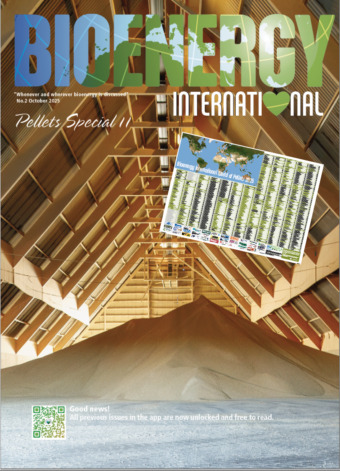At COP28 in Dubai, United Arab Emirates (UAE), Brazil-based Acelen Renewables, has disclosed more details surrounding its US$2.5 billion advanced biofuels project in which Macaúba, a native Brazilian plant with a high energy potential, will play a leading role.
Acelen Renewables is a recently formed subsidiary of Acelen, the energy holding subsidiary of Mubadala Capital, the asset management subsidiary of Mubadala Investment Company, a global sovereign investor based in Abu Dhabi, UAE.
We launched Acelen Renewables here at COP28 to showcase Brazil’s potential contribution to a more sustainable future. We will produce renewable diesel and SAF, Sustainable Aviation Fuel, reducing CO2 emissions by 80 percent compared to traditional fuels. This project is already a reality, in an advanced phase of engineering and its studies to implement agriculture on a large scale, emphasized Luiz de Mendonça, CEO of Acelen Renewables.
The company will reach the global market, banking on innovative solutions to ensure a large-scale supply of renewable feedstocks that guarantee efficiency, and productivity, and reduce environmental impact.
From seed to energy
Throughout the project, the expectation is to produce 1 billion liters per year [of renewable diesel and SAF.
According to a study conducted by the Getúlio Vargas Foundation (FGV), the projection is that a total of R$17 billion (≈ EUR 3.23 billion) will circulate in the Brazilian economy by 2035, directly and indirectly, from the project with a consequent increase in tax contributions across the entire production chain.
According to FGV’s analysis, the project is expected to create more than 90 thousand direct and indirect jobs, with 70 percent being permanent, related to the operation of the Renewable Energy Hub, and reduce carbon dioxide (CO2) emissions by up to 80 percent through the substitution of fossil fuels.
Scalable and replicable
This will position the company as one of the world’s largest producers of renewable fuels.
The company is expected to commence production in the second half quarter of 2026.
This is just the first step. The project is highly scalable. We plan to build several similar units to maximize the project’s impact and contribute to a greener future, emphasized Luiz de Mendonça.
Holistic project
The seed to fuel is seen as a unique project due to the formation of an ecosystem of strategic partners already contracted for agro development, biorefinery construction, certification, and fuel marketing.

The production capacity will be 20,000 barrels/day, approximately 1 billion litres per year, positioning Acelen Renewables among the world’s leading future fuel producers.
The production of renewable diesel and SAF will initially target the international market, where these products are already approved for commercialization and consumption.
The company will also invest in plant genetics, improvement of agricultural productivity, and the selection of suitable areas for cultivation, prioritizing degraded areas.
An industrial-scale seed germination laboratory for research investments is already in development in Brazil.
Socioeconomic and environmental benefits
The project is designed to be fully sustainable, with extensive decarbonization throughout the integrated chain, using a high-energy native plant for CO2 absorption and the recovery of degraded areas.
Economically, the expectation is to create a broad range of opportunities for agribusiness, for both small and large producers, as well as public-private partnerships.
With a focus on the recovery of degraded lands, at least five agro-industrial hubs with Macaúba cultivation will be established.
The expectation is that renewable diesel will emit up to 80 percent less CO2 than fossil diesel, and the high-energy plant cultivation is projected to capture 60 million tonnes of CO2 over 20 years.

Native oil palm species
The project envisages planting in an area of 200,000 hectares (ha) of degraded pastures in the States of Bahia and Minas Gerais and will be developed through public-private partnerships and the use of family farming, capturing up to 355 tonnes per ha of CO2.
In addition to adopting agriculture 4.0 technology, Acelen Renewables will develop the process of vegetable oil extraction, generating co-products with high added value and sustainably reusing waste.

Macaúba (Acrocomia aculeata) is a native perennial oil palm species with high oil productivity per hectare and a productive life of up to 40 years.
Being an adaptable plant it can thrive in various climatic conditions and with optimal growth in tropical climates, such as the Brazilian Cerrado.
In Brazil, Macaúba can be found in natural populations with variable extensions, particularly in the Cerrado of Minas Gerais, but its distribution covers several states, including Goias, Tocantins, Mato Grosso do Sul, Mato Grosso, São Paulo, Roraima, Para, Maranhao, Piaui, Ceara, and Bahia.
“High-performance plant”
Macaúba is also known for its tolerance to well-defined drought periods and considerable temperature variations.
With the adoption of good agronomic management practices, degraded areas can be recovered.
According to Victor Rafael Barra, Head of Agribusiness for Renewable Fuels at Acelen, the palm tree is a “high-performance plant” – it can generate seven times more oil per hectare and year than soybeans and offers greater efficiency in water and nutrient use.
Furthermore, as a native perennial species, it enables a range of environmental services such as biodiversity conservation or even restoration such as degraded pastures.
This allows for vegetative cover, conserving the soil and its biota, contributing to the recovery of water sources, and serving as a food source for birds and other native animals.
The Macaúba cultivation by Acelen will be carried out following the best agricultural and environmental practices, promoting the maximum productive potential of the plant, using agribusiness 4.0 and 5.0 tools, favoring carbon capture in plantations and the reduction of CO2 emissions, from seed to fuel. The project, headed by Acelen’s Agribusiness team, is marked by its innovation, involving exceptional professionals with consolidated experience in large-scale energy crop projects, who know how to use science in favor of development and innovation, with this, we will adopt pioneering protocols together with consolidated agricultural practices, ended Victor Rafael Barra.



